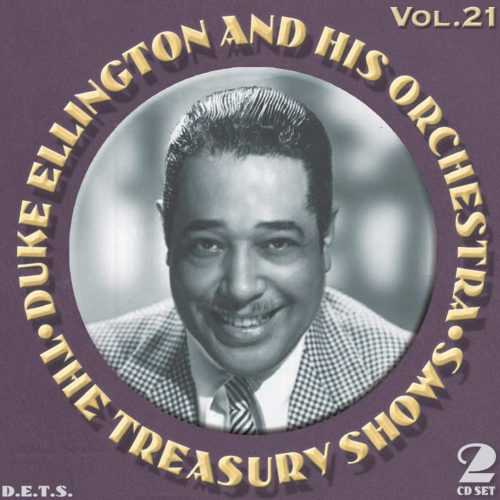What we have here is the welcome memento of Duke Ellington and his band’s 1959 European tour.
Berlin’s Sportpalast is not a concert hall and during the cursed Nazi reign often was the site of speeches by Hitler and his fellow criminals, but the hall can be said to have been thoroughly purified by sounds of jazz by the time of this concert.
The music starts with the Ellington Medley, by then a standard concert opener in varied embodiments. Critics often chided Duke for (in their opinion) overdoing this staple, but in fact it was not only a clever way of dealing with what undoubtedly would have been audience requests for beloved Ducal standards, but also a way of celebrating the continued life of his musical heritage. It also was subject to constant change, some due to new voices in the band, but most caused by Ellington’s own way of not making it a bore for his musicians. The Medley has a longer history than even serious students of Ellingtonia know. It makes its first appearance on records when Victor Records, in the depth of the Depression, introduced the Long-Playing Record. Yes, dear reader, in 1932! The discs, of a nice silvery hue, of course required a phonograph that could accommodate the required speed which was quite reasonably priced.
Some observations regarding personnel: An important new voice in the trumpet section was that of Clark Terry, previously with Charlie Barnet and Count Basie, most prominently. He came into his own with Duke but left after feeling that he got little to play other than his feature, Perdido. Aside from Terry, a non-soloing but important lead voice in the trumpet section is that of Andres Merenguito, also known as Fats Ford, who had served in Louis Armstrong’s last big band.
Trombonists Booty Wood and Britt Woodman/ the former great with the plunger mute, the latter great with high notes, were both proof of Duke’s way of finding new voices with personal traits. But the star of the section is Quentin “Butter” Jackson, whose long career included stints with McKinney’s Cotton Pickers, Cab Calloway, and Don Redman, first from 1932 to 1939 and then again for the 1946 European tour that included Copenhagen—first post-war visit by an American jazz band.
Bassist Wendell Marshall, a cousin of the immortal Jimmy Blanton, had some of the family genes with his full, pleasing sound, fine intonation and solid time. Less known is drummer Jimmy Johnson, remarkably effective as a stand-in for the gifted but frequently absent Sam Woodyard (they shared the drum chair for a moment). And then, of course, last but by no possible means least, the Ducal piano, from which he directs like a master conductor and accompanist. As is not always the case with live recordings he has a fine instrument at his disposal in Berlin, but one shortcoming here is the omission of his very personal verbal comments, mainly invocations of the soloists (some can be distantly heard).
We can be sure that the audience left satisfied—and so will you, having spent time in the good hands of a master.
Cat Anderson, Andres Marenguito (aka Fats Ford) (tp), Clark Terry (tp, flgh), Ray Nance (tp, vln, vo), Britt Woodman, Quentin Jackson, Booty Wood (tb), Jimmy Hamilton (cl, ts), Russell Procope (as, cl), Johnny Hodges (as), Paul Gonsalves (ts), Harry Carney (bars, cl, bcl), Duke Ellington (p), Jimmy Woode (b), Jimmy Johnson (dr), Lil Greenwood (vo)
Personnel on Basin Street Blues: Ray Nanace (tp, vo), Clark Terry (tp), Russell Procope (cl), Quentin Jackson (tb), Duke Ellington (p), Jimmy Woode (b), Jimmy Johnson (dr)
Recorded live in Sportpalast, Berlin, Germany on October 4th, 1959
CD 1
1. Black And Tan Fantasy 02:16
2. Creole Love Call 02:00
3. The Mooche 04:18
4. Newport Up 04:38
5. Such Sweet Thunder 02:39
6. Sonnet to Hank Cinq 01:28
7. Medley: Kinda Dukish / Rockin’ In Rhythm 05:58
8. El Gato 04:10
9. Flirtibird 02:48
10. Things Ain’t What They Used To Be 03:13
11. Skin Deep 11:23
CD 2
12. VIP Boogie 03:13
13. Jam Wih Sam 03:55
14. St. Louis Blues 03:08
15. Bill Bailey 02:30
16. Walkin’ And Singin’ The Blues 02:28
17. Don’t Get Around Much Anymore 01:48
18. Do Nothing Till You Hear From Me 00:34
19. I Got It Bad 02:37
20. In A Sentimental Mood 00:50
21. Mood Indigo 01:03
22. I’m Beginning To See The Light 00:49
23. Sophisticated Lady 02:14
24. Caravan 01:41
25. Solitude 02:45
26. Satin Doll 03:36
27. Medley: I Let A Song Go Out Of My Heart / Don’t Get Around Much Anymore 01:34
28. Basin Street Blues 07:22
“When you indulge in the fragments of Duke’s masterpieces, there is no doubt that Duke Ellington knew what he was doing with the german audience.” Henrik Wolsgaard-Iversen, Jazz Special
“…if you want to hear an Ellington hit medley, you can’t beat the two on Berlin 1959. This is one of the very best live Ellington concert recordings to have surfaced in the almost half-century he has been gone.” – The New York City Jazz Record
“In 1959, jazz evolved, as well as the Ellingtonian formation judiciously renewed and enriched over the years. Undoubtedly one of the best that the Duke has ever conducted…” – **** – Jazz Magazine
Related products

The Duke In Munich

The Piano Player

The Treasury Shows Vol. 21



